
Issue No. 1
April 2006
Dear brothers and sisters in Christ.
Warm greetings. “We always give thanks to God for all of you and mention you in our prayers, constantly remembering before our God and Father your work of faith and labor of love and steadfastness of hope in our Lord Jesus Christ” (1 Thes. 1: 2-3).
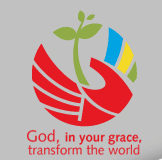 |
We are very glad to share with you in this issue of our Ecumenical Letter on Evangelism, some information on mission and evangelism, emerging from the World Council of Churches’ 9th General Assembly, which took place in Porto Alegre, Brazil from February 14-23, 2006, on the theme: “God, in your grace, transform the world”. We are publishing the final report of the Ecumenical Conversation No. 1: “Mission for Healing and Reconciling Communities”, which took place in three sessions, and two presentations shared in the workshop 75: “The Word we proclaim: Voicing the gospel in the context of brokenness and dehumanisation”, underlining the intergrity of the gospel for transformation. The workshop was prepared by the WCC’s Urban and Rural Mission and Evangelism desks. |
The first presentation was “The Bible, Evangelism and Social Justice” by Father Gosbert T.M. Byamungu, an African Roman Catholic professor at the Bossey Ecumenical Institute, and the other, “God’s Mission of Restoration, Salvation, Liberation & Reconciliation”, by Rev. Dr. Sherron George, from the Presbyterian Church (USA) and professor of missiology in Brazil.
Finally, we are also including in print form an interview featuring Evangelical and Pentecostal voices heard at Assembly, highlighting the importance of evangelism for the whole oikoumene.
We hope you find all this information useful. For further research, please visit the Assembly’s website. Important documents, including the “Message of the 9th Assembly of the World Council of Churches: An Invitation to Prayer” can be found.
Evangelistically yours,
Carlos Emilio Ham (cah@wcc-coe.org)
WCC Programme Executive for Evangelism
Ecumenical Conversation No. 1
Mission for Healing and Reconciling Communities
Final Report
Introduction
In a time of globalization, violence, ideological polarization, fragmentation and exclusion, what is the importance of Christian mission? This Ecumenical Conversation offered the opportunity to reflect on the message of the gospel and mission methodologies in such a context.
Saint Paul speaks of the new creation heralded by Christ and enabled by the Holy Spirit. “In Christ”, Paul says, “God was reconciling the world to himself, not counting his trespasses against them, and entrusting the message of reconciliation to us. So we are ambassadors for Christ, since God is making his appeal through us; we entreat you on behalf of Christ, be reconciled to God” (2 Cor. 5.19-20). It is this “new creation”, by God’s transforming grace, that we believe to be the goal of God’s own mission.
Reconciliation, as the restoration of right relations with God in Christ, is the source of reconciliation with oneself, with other people and with the whole of creation. As Christians, we are called to receive and celebrate this gift and, empowered by the Spirit, to involve the churches in relevant forms of mission and proclamation that point to Christ’s vision of fullness of life for all.
As ambassadors of this message and partners in God’s mission, the churches are called to reach out to individuals, families, communities, churches and nations bearing witness to the power of the Holy Spirit, to transform the world as a living sign of God’s new creation. We are called to be agents of healing and reconciliation in the midst of illness and disease, conflict and tension, crisis and suffering. But we also are called for discipleship in the midst of the search for meaning and community where “private” forms of spirituality or religiosity seem most attractive and where churches are loosing clergy and members.
The road to reconciliation and healing is not an easy one. It involves listening, truth telling, repentance, forgiveness and a sincere commitment to Christ and his justice. It includes physical, mental, emotional and spiritual healing. It involves healing in the midst of struggles for social, economic and ecological justice. It involves reconciling communities and churches in conflict. It involves nurturing congregations seeking renewal. It involves proclaiming and testifying to the gospel of transforming grace where people are desperately looking for spiritual meaning. It lives in the tension of the coming of God's reign as “already here” and “yet to come”, but with the assurance that all true healing comes from God.
Within our many traditions, we share rich resources of experience, testimonies and gifts to strengthen our common witness to the Risen Lord. These include healing through prayer, ascetical practices and charisms; sacraments and liturgies; medical and spiritual ministries; social and systemic approaches – all sustained by the presence of the Holy Spirit.
The Ecumenical Conversation
Day 1. What are the strengths and weaknesses of mission and evangelism as healing and reconciliation?
Rev. Ruth Bottoms – Baptist pastor and former Moderator of the Commission on World Mission and Evangelism, recalled that the Commission identified Healing and Reconciliation as the thematic focus for the 2005 Athens World Mission Conference. We have been called to share in the ‘Missio Dei’, entrusted with a ministry of reconciliation, to be followers of Jesus who was a healer, who not only preached but also performed good works.
| Several voices said that we did not give enough time and space to considering the content of the good news that we seek to share, nor to our expressions of evangelism. Have we become fearful of talking about and practicing evangelism? We acknowledge that one person’s evangelism can be another person’s proselytism, but there is a need to be talking together about this if our witness is going to be authentic. How are we going to continue with such a dialogue? How can the WCC create the ecumenical space where we can continue to be in dialogue about our understandings of mission and evangelism? | 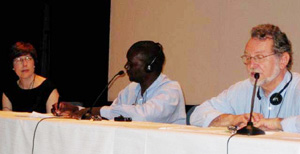 |
Lively discussions in small groups focussed on sharing experiences and insights around the questions of healing and reconciliation. There was also discussion around the issue of abuse of power in mission and evangelism practices.
For the mission of healing and reconciliation, some key themes emerged:
Dialogue as a pre-condition, recognizing that healing and reconciliation are also of concern for other organizations besides the churches. How to work in partnership with other actors in society?
Solidarity with those who suffer: taking time to listen to them and allowing them space to grieve and express their anger. Reaching out as ambassadors of reconciliation, recognition of our need to be healed and reconciled before we can facilitate healing and reconciliation of others, and affirmation of the importance of rituals and religious practices to assist in healing process. The necessity for the churches to take into account the impact of consumerism and secularization on the Christian faith and avoid producing ready-made solutions.
Among the examples of the abuse of power in mission and evangelism practices, the following were cited: the arrogance in the way of doing mission and “christianizing” people, causing suspicion and prejudice about Christianity itself. The issue of language and its imperialistic connotations. The so-called “theology of prosperity” and the corruption which goes with it.
Day 2. Sharing and learning from various experiences
Rev. Hector Petrecca, Argentinean, from the Pentecostal tradition, highlighted the churches as therapeutic communities, following God’s mission through Jesus to bring restoration, healing and liberation. Healing and reconciliation are a priority, as well as announcing the good news to the poor. In helping our neighbors, no matter what religion they belong to, we give them hope along with shelter, food, and clothing to enable people to find some inner healing. He noted the necessity of acknowledging youth as a priority.
Ms. Hae-Sun Jung, from the Methodist Church in South Korea, shared the concrete example of the Korean Churches’ Ministry of Reconciliation between the two Koreas. It is closely related to the issue of survival for the peoples in both countries. Peace and reconciliation must precede systematic re-unification, which is part of the reconciling ministry of the churches, implemented through dialogue, prayer and cooperation on humanitarian aid.
Prof. Dr. Dimitra Koukoura, from the Ecumenical Patriarchate, Greece, spoke about the healing ministry in the Orthodox Tradition , understood as the restoration of our human condition as images of God. The Eucharist is seen as the ‘medicine’, which heals all wounds.
Following the presentation of these three case studies, participants shared other examples from their own contexts, illustrating how their churches were facing the challenges of responding to the tasks of healing and reconciliation in their respective communities and nations.
Day 3. The way forward
Rev. Dr. Marian McClure, Presbyterian Church (USA) introduced the Conversation by asking the question: ‘What are the areas where we need help from the WCC when they relate to reconciliation’? She proposed some directions and then asked participants: ‘Is this the right list for the current time’?
a) Addressing evangelism and proselytism
Ruth Bottoms had previously noted clearly that “one person’s evangelism is another person’s proselytism”. The churches of the world are sending many thousands of missionaries into the field and my own agency is privileged to be part of this endeavor. At the same time we believe in truly respectful relationships with existing churches in each place. Sometimes those churches protest missionary activity. So it will be very important for the World Council of Churches to help all of us reconcile the values we hold that are in tension on this subject, and also to be reconciled to each other in this practice of evangelism.
b) Helping to show that Christians care, during large and sustained crises
When disease and destruction occur on a massive and enduring scale, the world community watches and asks, “did the Christians show that they really cared?” For example, the WCC has helped us all to show that our answer to that question is yes, especially in relation to HIV/AIDS and the sustained crisis of deepening poverty. The kind of work and mission that is done through the WCC will affect how hundreds of millions of people view Christians for years to come. This has a reconciling effect. Through the WCC the churches need to remain sensitive to these priorities and to develop our collaborative work in mission accordingly. In this way we can show that the churches care, and can also learn from each other about models for mission involvement. Thus, churches can experiment with different approaches and ways of collaboration to improve our own mission efforts.
c) Encouraging the formation of a transnational community
The churches through their mission efforts, as well as in their ecumenical and interfaith activities, build friendships and relationships, which would be very unlikely to exist otherwise. These friendships are the source of an amazing amount of spiritual transformation. These transnational relationships are probably the single most powerful source of transformation for members of the churches in the United States today. Through relationships, the desire and hope for reconciliation among peoples is developed, and the experience of sharing the gospel in new ways is strengthened. For the most part, relationship forming is the work of the member communions. The World Council of Churches can help churches address those situations where relationship forming is blocked or needs special care or special facilitation. One could think of situations such as: North and South Korea, Taiwan and China, accompaniment in Palestine and Israel, etc. |
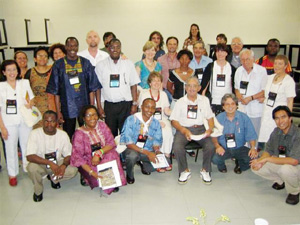 |
While people in the North tend to be more and more insulated, relationship forming is becoming increasingly important, but it can be difficult as well. So perhaps this could also rise to a priority role for the WCC. Certainly the single most memorable, healing and reconciling moment for me in these seven years with the CWME was when the majority of the members of Commission, not from North America answered the question “what are five of the most important issues for mission in the next 50 years,” and one of the answers was “the re-evangelization of North America and Europe.” Thank you for that deeply encouraging word!
Rev. Dr Bernard Ugeux, Roman Catholic priest, France, led the reflection towards a renewed understanding of the concept of ‘holistic’ healing. The proclamation of the good news is taking place in those communities that show evidence of reconciliation and healing in their own life. The world itself challenges us to make our teaching of the gospel consistent with our relationships with others.
At the Athens CWME conference, we spoke much of holistic healing, i.e. healing that affects all dimensions of human life, both individual and social: spiritual, physical, emotional, relational, cultural, political, economic, and environmental. All these aspects of life can become disordered or damaged and in need of healing by the community taking action. The advantage of the expression ‘holistic’ is that it brings out the complexity of persons and the task of mission and of medicine in order to bring and hold together all these dimensions.
The danger, for privileged societies, is that they can regard health as a state of perfect wellbeing. Moreover, there is another risk, and that is to regard health and salvation as identical. Jesus healed to indicate that his salvation was concerned with the whole person. All those who are healed are not saved, nor are all those who are saved neither healed. But it is for everyone that Christ died and rose again.
We must, always care for all people. Christ, certainly, will not always heal physically, but he does heal hearts and spirits. He is never indifferent, even when he seems to be silent. We must then learn to discern when he is acting discreetly. The foremost important spiritual healing often concerns one’s relationship to God, whom one is tempted to accuse of being the cause of a disease or of being indifferent. What is needed is the re-establishment of a trusting relationship with God our Father.
Workshop 75: “The Word we proclaim: Voicing the Gospel in the context of brokenness and dehumanisation”.
The Bible, Evangelism and Social Justice
Father Gosbert Byamungu
The Bible, the Word of God, is God’s condensed wisdom for Life. In this Word, God wants to nourish his children on the difficult path of life. In it, we do not find only consolation, strength and courage for the journey, but also wisdom as how to live this life meaningfully. If the Gospel is “Good News” to the poor, if it is a message of Love, then the Bible is also a message of justice. Evangelism can therefore not shun away from concrete acts of love, which is the best antidote to every form of injustice, be it social or systemic.
The whole debate begins with the missionary agenda of the one who came to give us Life. At the beginning of his ministry, Jesus in Luke 4,16 ff, states his missionary program: “ to bring Good News to the poor; to announce the release of captives, the recovering of sight to the blind, to set at liberty those who have been bruised, and to proclaim the year of favor.” At the end of life, in Mt. 25, we hear Jesus say, “I was hungry, and you gave me something to eat […], naked, you clothed me […]. I was in prison, and you came to visit me […].” Evangelism and blessedness are about giving life to the full to those who have it less in some way. If we call them the marginalized of our society, Missio Dei is precisely about bringing “blessedness to the poor” (6,20), and evangelism embraces the same mission. Luke does not shut the door on anyone.
Indeed, the Gospel tradition has transmitted to us five parables exclusive of Luke. These are about dichotomy and justice. They are: (1) The Good Samaritan (Luke 10,30-37); (2) The Rich Fool (Luke 12,16-21); (3) The Rich Man and Lazarus (Luke 16,19-31; (4) The Pharisee and the Publican (Luke 18,10-14); (5) The Wedding Guest (Luke 14,7-11) and the Proper Guests (Luke 14,12-14). All these parables grouped together, are about the proper way of behavior. For the scope of this presentation, let me single out the Rich Man and Lazarus.
| The two, Lazarus and the Rich Man are presented in two scenes, the one in this world, the other in the next. In this world, the two are separated by a gate, which is always closed. Inside the gate, in the house, there is life in luxury, outside the gate sits Lazarus in want. The gate could have been opened to admit Lazarus to eat at least the crumbs, but the rich man does not even notice the poor man. Then the two die and the fortunes are reversed. Between Lazarus in glory at the bosom of Abraham and the Rich man in torment is a fixed chasm. Here, no communication is possible. The clock cannot be turned back. The sin of the rich man is that he “did nothing” in the face of misery and human suffering. Bridging the gap between the rich and the poor can only happen during this life. It is too late in the life after. I think the assembly theme is a plea to bridge this gap now, which has consequences in the life to come. Now seems to be the time to open the gates of oikoumene. | 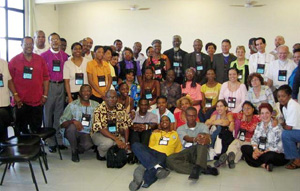 |
Luke is also keen on spirituality, especially on forgiveness as the wise process of approach to all these questions. In chapter 6,12, Jesus spends a whole night in prayer. Then at dawn he calls his disciples, out of whom he chooses the 12, the apostles. Then he delivers what is considered the most important teaching of his ministry: the sermon on the plain. His words are a challenge: “Love your enemies, do good to those who hate you, bless those who curse you, pray for those who mistreat you […]”. That is the wisdom of every Christian. It is the method of transformation of the world. For, as he puts it, “if you do good to those who do good to you, what merit (charis=grace) do you have? Even the sinners do good to those who do good to them. The accent is on “doing” (poiein).
I think this is the challenge of evangelism and of being Christian for all time. If the world will ever be transformed, it will follow our being transformed by these teachings of the Lord. He, whom John calls “the Word (Logos)” who came as “Light” in the world in “darkness,” tells us, “You are the Light of the World.” We are sent to reflect his Light into the world, transforming it, as it were, from its darkness, thus making it as God wanted it to be in the first place. The strength to do all this is found in the nourishment that is contained in the Sacred Scriptures. The Scriptures will transform our vision of the world, so that we can see clearly what it takes to build just and inclusive systems, to give fullness of Life to all God’s children. That is the goal of evangelism, and it embraces every aspect of global justice.
Rev. Dr. Sherron George
Presbyterian Church (USA), professor of missiology in Brazil.
GOD'S MISSION
OF RESTORATION, SALVATION, LIBERATION & RECONCILIATION
is the foundation and source of the mission of the church
MISSION, therefore,
is the identity, reason, and purpose of the church
is the responsibility of every baptized Christian
is done in partnership with God for God's glory in 6 continents
by the church in 6 continents
is local-global and holistic (integral) without
compartmentalization, polarization, or dichotomy.
Therefore, God's mission sends the church into the world
with at least 3 roles and always includes and mixes 3 aspects:
EVANGELISM
(church as messenger)
with bold humility and respect by lifestyle, words, attitudes, and actions
Verbal Proclamation of "Good News"
Faithful Witness & Dialogue
Faith Commitment & Sharing
Inviting/Calling
Hospitality - Welcoming/Receiving
Initiation/Belonging/ Baptismal Calling
Assimilating New Members & Gifts
New Church Development
Intention: "Life in all its fullness" Conversion/Discipleship/Growth
Confessing Jesus as Lord
Building the Church
Self-Propagation
COMPASSIONATE SERVICE
(church as servant/diakonia)
with mercy by actions, attitudes, dialogue, lifestyle, and words (why?)
Emergency Crisis Assistance
Displaced Persons
Human Need: Dignity, Food, Shelter, Health, Education, Living Wage
Interfaith Dialogue and Cooperation
Formation of Coalitions & Alliances
Intention: Serving human need
Capacity-building/Empowerment
Healing and Building Sustainable Communities
Promoting the Values of God's Reign
SOCIAL JUSTICE
(church as prophet)
by political actions, attitudes, dialogue,
lifestyle, and (words - why?)
Reconciliation and Peace-building
Human Rights
Advocacy
Solidarity with the Poor
End to Violence, Terrorism & War
Economic Justice
Just Distribution of Power & Systems
Ecological Justice
Public Policy
Interfaith Dialogue and Cooperation
Intention: Social Transformation
Promoting the Values of God's Reign
FINAL GOAL OF ALL MISSION:
GOD'S GLORY AND REALM OF LOVE, PEACE, AND JUSTICE
Evangelical and Pentecostal voices heard at Assembly – 20/02/06
Evangelical and Pentecostal participants at the World Council of Churches 9th Assembly welcomed better relationships with WCC churches and called for greater co-operation in the future.
Speaking to journalists on Monday, February 20, were three leading evangelical figures: Rev. Geoff Tunnicliffe, international director and CEO of the World Evangelical Alliance (WEA), who said that the WEA "parallel network" of 400 million Christians identified with many of the WCC's themes, such as work on HIV/AIDS, violence and poverty.
He said that evangelical Christians - of which there were many in WCC churches - were committed to integral mission, the proclamation and demonstration of the gospel. "If we ignore the world, we betray the word; if we ignore the word, we have nothing to bring to the world," he said.
The WEA was not a member of the WCC, he said, partly because of structural differences between the two institutions and partly because of some "historical and deeply-felt issues". The way ahead, he said, was "to find connections around issues" such as the northern Uganda crisis on which there was agreement.
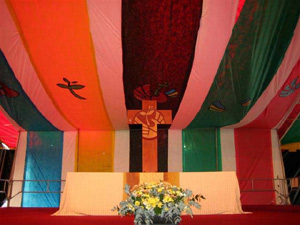 |
Responding to a question about evangelism and proselytism, he said that the desire to see personal conversion was "at the heart of the evangelical movement". Nevertheless, he added, "We need to work on best practices about how we engage in evangelism." Rev. Dr Michael Ntumy, chairman of The Church of Pentecost in Ghana, made an impassioned plea for closer connections between Pentecostal and WCC churches. He referred to the origins of Pentecostal congregations a century ago, many of them the result of acrimonious separations from old churches. "Although time does not necessarily heal all divisions, 100 years is long enough," he said. |
In the Assembly, he said, he had observed "the beauty of confessional diversity". He praised the strong emphasis in WCC churches on the social gospel, but remarked that "the Pentecostal emphasis on the proclamation of the gospel is an area WCC churches do not emphasize enough".
If Pentecostal, WCC churches and the Roman Catholic Church were to come together, he said, "We would become a spiritual colossus in the hands of God". He concluded, "Our doors are open; come, let's talk."
Rev. Dr Norberto Saracco of the Good News Evangelical Church in Argentina, spoke of the ecumenical advances made in Latin America at the initiative of evangelical and Pentecostal churches, and of the growth of non-denominational churches.
"In Latin America, we are entering into a post-Pentecostal era, which will create better conditions for ecumenical dialogue," he said. Referring to the text of his later speech to a plenary session on church unity, he said, "For evangelical churches, unity is not based on the recognition of an hierarchical authority, nor on dogmas, not on theological agreements, nor on alliances between institutions. We have to accept that that way of doing ecumenism has gone as far as it can."
He praised the Latin America plenary session the previous day, which had stressed the severe social and economic problems of the region. "The great majority of Pentecostal churches have a serious and profound commitment to the struggles of our people," he said.
He said that evangelical churches had revised antagonistic positions they had taken towards churches connected with the ecumenical movement, and had asked their pardon. He called for an "ecumenical simplicity" that would "help an ecumenism that has come to a standstill to break out of its inertia".
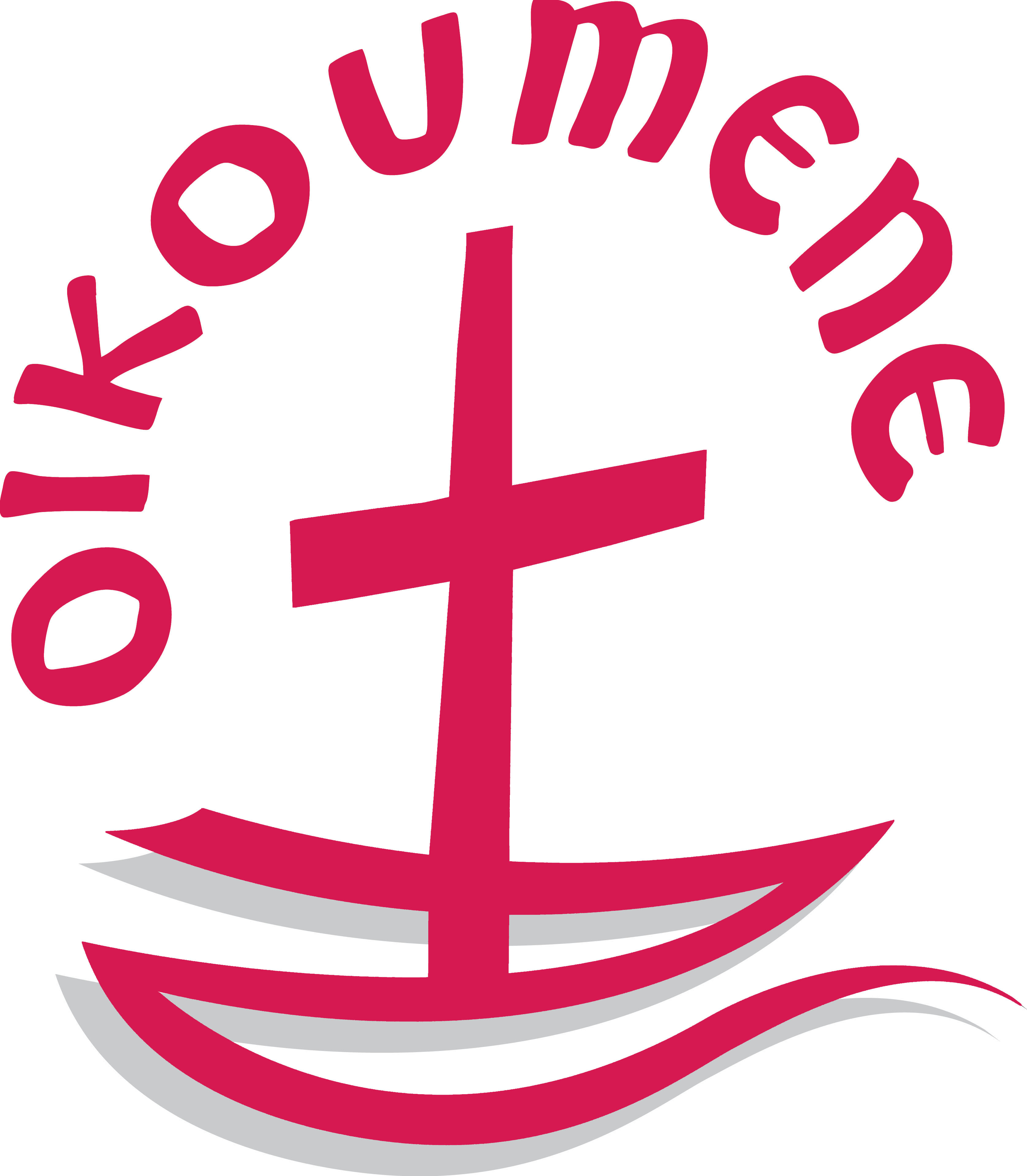 |
We invite you to our Ecumenical Institute of Bossey Seminar on: MISSION AS PROCLAMATION OF THE GOSPEL |
 |
The CWME Mission Conference in Athens, Greece (May 2005), highlighted mission as participation in the ministry of healing and reconciliation. Among the challenges which need further work is the role of the proclamatory aspect of Christian witness and church life. This Bossey seminar aims at specifying content and methodologies of evangelism in an ecumenical perspective.
Drawing on the results of the both the Athens Conference and the WCC 9th Assembly in Porto Alegre (February 2006), these are some of the questions which will be addressed by the seminar.
Exploring the way towards a new ecumenical agenda for evangelism in the 21st century is an urgent imperative in many regions of the world as well as in the global ecumenical movement. In addition, Evangelism is an important component, as WCC seeks to broaden the vision of ecumenism with the participation of non-WCC member churches.
Staff: Rev. Dr Carlos Ham, Rev. Jacques Matthey and Ms. Arantxa Aguado, WCC Mission and Evangelism Programme and Rev. Dr Dietrich Werner, Director of Studies at the Christian-Jensen Kolleg, Northelbian Center for World Mission and World Service, Breklum, Germany.
Dates: 6-12 June 2006
For more information and to download the application and scholarship instructions and forms, please visit the website